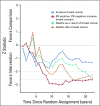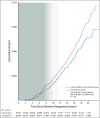Dietary Modification and Breast Cancer Mortality: Long-Term Follow-Up of the Women's Health Initiative Randomized Trial
- PMID: 32031879
- PMCID: PMC7193750
- DOI: 10.1200/JCO.19.00435
Dietary Modification and Breast Cancer Mortality: Long-Term Follow-Up of the Women's Health Initiative Randomized Trial
Abstract
Purpose: Observational studies of dietary fat intake and breast cancer have reported inconsistent findings. This topic was addressed in additional analyses of the Women's Health Initiative (WHI) Dietary Modification (DM) clinical trial that evaluated a low-fat dietary pattern influence on breast cancer incidence.
Methods: In the WHI DM trial, 48,835 postmenopausal women, ages 50-79 years, with no prior breast cancer, and a dietary fat intake of ≥ 32% of energy were randomly assigned at 40 US centers to a usual diet comparison group (60%) or dietary intervention group (40%). The goals were to reduce fat intake to 20% of energy and increase vegetable, fruit, and grain intake. Breast cancers were confirmed after central medical record review and serial National Death Index linkages to enhance mortality findings.
Results: During 8.5 years of dietary intervention, breast cancer incidence and deaths as a result of breast cancer were nonsignificantly lower in the intervention group, while deaths after breast cancer were statistically significantly lower both during intervention and through a 16.1-year (median) follow-up. Now, after a long-term, cumulative 19.6-year (median) follow-up, the significant reduction in deaths after breast cancer persists (359 [0.12%] v 652 [0.14%] deaths; hazard ratio [HR], 0.85; 95% CI, 0.74 to 0.96; P = .01), and a statistically significant reduction in deaths as a result of breast cancer (breast cancer followed by death attributed to the breast cancer) emerged (132 [0.037%, annualized risk] v 251 [0.047%] deaths, respectively; HR, 0.79; 95% CI, 0.64 to 0.97; P = .02).
Conclusion: Adoption of a low-fat dietary pattern associated with increased vegetable, fruit, and grain intake, demonstrably achievable by many, may reduce the risk of death as a result of breast cancer in postmenopausal women.
Trial registration: ClinicalTrials.gov NCT00000611.
Figures



Comment in
-
Could the Women's Health Initiative Breathe New Life Into Breast Cancer Prevention?J Clin Oncol. 2020 May 1;38(13):1375-1377. doi: 10.1200/JCO.20.00148. Epub 2020 Mar 9. J Clin Oncol. 2020. PMID: 32150487 No abstract available.
References
-
- Prentice RL, Caan B, Chlebowski RT, et al. Low-fat dietary pattern and risk of invasive breast cancer: The Women’s Health Initiative randomized controlled dietary modification trial. JAMA. 2006;295:629–642. - PubMed
-
- Howard BV, Manson JE, Stefanick ML, et al. Low-fat dietary pattern and weight change over 7 years: The Women’s Health Initiative Dietary Modification trial. JAMA. 2006;295:39–49. - PubMed
Publication types
MeSH terms
Substances
Associated data
Grants and funding
LinkOut - more resources
Full Text Sources
Medical

